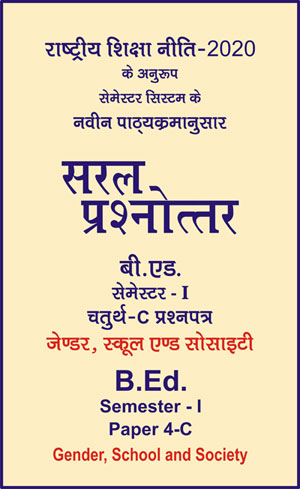|
बी एड - एम एड >> बी.एड. सेमेस्टर-1 प्रश्नपत्र-IV-C - जेण्डर, स्कूल एण्ड सोसाइटी बी.एड. सेमेस्टर-1 प्रश्नपत्र-IV-C - जेण्डर, स्कूल एण्ड सोसाइटीसरल प्रश्नोत्तर समूह
|
5 पाठक हैं |
||||||
बी.एड. सेमेस्टर-1 प्रश्नपत्र-IV-C - जेण्डर, स्कूल एण्ड सोसाइटी (अंग्रेजी भाषाा में)
Question- What is meant by Empowerment? Explain its meaning and also mention the definitions.
Related Short Answer Questions
- Give any two definitions of Empowerment.
- What type of medium is Empowerment?
Answer -
This word is related to the power or authority which one person or society or government can bestow on another person or group of persons (class group, caste group, religious group or gender-based group). It involves the belief that one group (men, the elite, the wealthy or performs) enjoys authority over another group (landless, working class, ethnic minorities or women). These empowered or empowered people make some way or the other control over the actions or choices of other class of people. This type of control can be direct through pressure, physical control of economic assets and the use of coercion and can be indirect or subtle through psychological processes. These psychological processes affect groups in such a way that their options are limited.
Most writers understand fields of Power empowerment to be more than simply giving up power because with it comes two beliefs - that if any power can be given, it can be taken back equally easily. Mere ‘transfer of power’ thus becomes a sham and what could have been only a seeker’s view of growth and development for the marginalized groups becomes a means to an end. (Rowland, 1988). For example, when we talk about women empowerment, the emphasis is not only on empowering women but on bringing them into the mainstream so that they can participate in economic activities and contribute to development. Here the goals of empowerment are narrow and transference also appears to be a gimmick, so in the field of empowerment, a section of thinkers go ahead with the power to empower someone by including ‘power with’ and ‘power from within’. Prefers to focus on ‘process’. Hardsock is what is called the energy definition of power. That force is contrary to the definition of obedience and it is of a generative nature through leadership which seeks to see that a group is worthy of it without conflict of interest and the group to do its own agenda. It is the power to motivate and elevate activity in others that some have (Hardsock, 1985). One aspect of this power is that the group should create a leadership from within itself to achieve what it deserves and also decides its own program.
A groundbreaking work in the field of empowerment was that of Foucault (1982) for which power was not an infinitesimal entry that could be traced; power is relative and has no substance and is formed in the web of social relations between those people. Those who are at least to a minimum degree free of action. They see power as a ‘mode of action’ over action. As a form of power, there was an element of resistance and so where there is power, there is resistance. This was especially true for them in the context of petty policies and local use of power that had their roots in systems of social networks. That brings us to those analysts who considers the power to be in addition to some ‘power over’ and some to ‘power’ which includes a sense of completeness which is greater than the sum of individuals; For example, groups taking problems together (Williams et al., 1995). People working together are more likely to bring about change than a single individual working, in the end there is power from within, it is the spiritual power that takes birth in man. It is based on self-acceptance and self-respect, which culminates in treating others as equals, and once such awakening occurs, it culminates in empowerment.
Empowerment thus gives an impression of the interaction of one with another and the development of power from within and is not limited to giving up the ‘shakti’ form of ‘Shakti’. The interaction of power leads us to physical, social and economic empowerment. Thus, the word empowerment is not just a rhetorical device but also an active medium to bring about change with justice. Thus, empowerment is not only concerned with opening the way for involvement in the decision-making process, but it should also include those processes that result in people seeing themselves as eligible and entitled to participate in the decision-making process. are (Rowland, 1995). While some see the empowerment of the individual as giving him authority in the decision-making process and achieving self-reliance, it also refers to the collective empowerment of marginalized groups.
|
|||||













